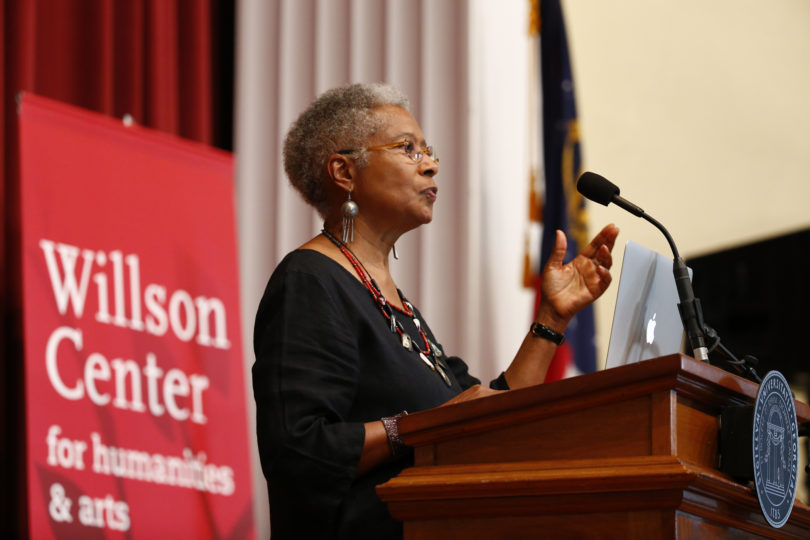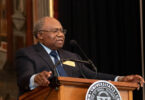Alice Walker, the Pulitzer Prize-winning author of The Color Purple, delivered a message of courage, empathy and self-empowerment to the UGA and Athens communities this month. Walker, who came to UGA as the Delta Visiting Chair for Global Understanding, spoke to capacity crowds Oct. 14 at the Chapel and Oct. 15 at the Morton Theatre in downtown Athens.
Her message, which Walker delivered with her thoughtful, Zen-like tone, resonated with UGA students like Mansur Buffins, a second-year social studies education and African-American Studies major. Buffins got to meet with Walker for an intimate conversation with several other students at the Willson Center for Humanities and Arts Oct. 14.
“I love how she lives freely,” Buffins said. “My takeaway is that I should stop worrying about what other people think of my ideas and goals and get rid of that fear of other people’s criticism and learn along the way.”
Walker is the first African-American woman to win the Pulitzer Prize in fiction. Beyond her most famous novel, The Color Purple, she has written six other novels, four collections of short stories, four children’s books and volumes of essays and poetry. Throughout her public life, she has been an international activist for civil and human rights and a forceful advocate for women and girls.
Walker is the inaugural Delta Visiting Chair, which was established by the Willson Center for Humanities and Arts through the support of the Delta Air Lines Foundation to host outstanding global scholars, leading creative thinkers, artists and intellectuals who teach and conduct research at UGA.
As part of her visit, Walker met with students from UGA, Emory University and Spelman College as well as high school students from Walker’s birthplace of Putnam County at the Willson Center parlor. In this cozy setting, students asked Walker questions about her writing, her relationships and her philosophies about life.
For Juhi Varshney, a third-year women’s studies and biochemistry double major at UGA, it was an opportunity to have a face-to-face talk with one of America’s great authors.
“It was surreal to have read her work and then to have an intimate conversation with her,” Varshney said. “It was indescribable.”
During the conversation, Walker asked students about their studies and career aspirations. She implored them to pursue their passions.
“You have a perfect right to exist as you,” she told them. “If you love something and you’re really, really interested, there is nothing that will get in the way.”
At her appearance at the Chapel, Walker shared stories about her international journeys to the Soviet Union, Cuba, China and Uganda. From each of these trips, she said, she found a connection to people from other cultures and nationalities. She said she found kindness from people who were supposed to be enemies of the U.S. She challenged mainstream ideas of Western consumerism and U.S. foreign policy and said that it’s important for Americans to learn about people in other nations.
Nisha Katti, a fourth-year international affairs and public relations major, said she was surprised how candid and relaxed Walker was with her lecture at the Chapel.
“She spoke to the audience like it was a coffee shop chat,” she said. “And there were some very funny moments. I like the way she spoke by telling stories.”
What stuck out to Katti was Walker’s description of racism as “unnatural.” Walker said racism in the South led to whites acting “unnaturally” when they discriminated against African-Americans.
Valerie Boyd, an associate professor of journalism at UGA’s Grady College, moderated Walker’s evening appearance at the Morton Theatre. The Charlayne Hunter-Gault Distinguished Writer-in Residence, Boyd is editing Walker’s journals for an upcoming book. She asked Walker about her childhood in Eatonton, her activism on international and women’s issues, and her philosophy on freedom.
On that last question about freedom, Walker said, “It means the way that I am is the way I’m supposed to be.”
In all of her appearances, Walker talked about her love for reading. As a child, she said, reading was what made her aware of the world beyond her hometown. It inspired her to travel, to write and find humanity in others.
“I discovered you could leave Eatonton and go to 18th century London for a whole afternoon, and no one would even know.” she said at the Morton Theatre, “(Reading) is the door to the you that you can become.”
Nicholas Allen, the director of the Willson Center, said Walker’s visit was a compelling beginning for the Delta Visiting Chair.
“Alice Walker shared a vision of empathetic intelligence with our students, faculty and friends across the community,” said Allen, the Franklin Professor of English. “In years to come, the Delta Visiting Chair will bring generations of the world’s leading artists and creative thinkers, and Alice Walker’s visit was a rich and thought-provoking experience to begin this journey.”








